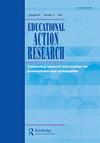中东和北非行动研究(MENA)
IF 1.2
Q3 EDUCATION & EDUCATIONAL RESEARCH
引用次数: 0
摘要
我们很兴奋,但也有一点失望,终于看到《中东和北非地区行动研究》的主题部分在该杂志上发表。令人兴奋的是,这四篇论文的质量证明了行动研究可以对教学实践的转变产生强大的影响。有点失望,因为我们最初是如此充满希望,我们会有更多的文章选择,当我们发起论文征集,并收到这么多的兴趣表达。由于时间和工作量的压力,或者我们认为最普遍的原因是,对他们在这样一本备受尊敬的国际期刊上所能提供的东西缺乏信心,由于作者未能继续他们最初的热情,潮水般的兴趣逐渐减少为涓涓细流。然后,收到的许多意见书被证明与行动研究无关,或者只是对方法和文献的肤浅掌握。在我们的职业生涯中,我们花了很多时间来指导和发表行动研究(Hunt 2010;Quirke 2001),并见证了整个中东和北非地区的良好做法。然而,考虑到我们在一个坚持定量、科学范式高于一切的地区认可我们自己的行动研究所面临的困难,我们应该理解为一个特刊整理足够的文章的困难。令人难以置信的是,为了确定工作的有效性和可靠性,所有定性研究方法,包括行动研究,仍然必须听从Edge和Richards(1998)的建议,并为结果提供明确的方法和评估理由。研究人员必须使用严格的三角测量技术,这些技术不一定反映被评估的研究传统的术语、价值和目的。对使用行动研究的反应的一个具体例子,可以用来说明中东和北非地区更广泛的抵制,涉及阿拉伯联合酋长国(阿联酋)本科教育方案的行动研究部分。尽管这是一个历史案例,但它突显了对该计划的强制性及其对阿联酋背景的适用性的怀疑。第一个批评是行动研究是该方案的一个强制性方面:它构成了最后一年的一个重要方面,要求学生在他们的教学实习地点进行小规模的行动研究。这种行动研究的强制性似乎与自下而上的、自发的、探索性的行动研究的理解相矛盾,似乎鼓励授权,同时通过强迫学生参与“战略服从”来消除不平等的权力关系(Day和Pennington)。在这样做的过程中,它有效地减少了对学生必须证明才能获得认证的技术的反思。第二种批评侧重于作为一种文化实践的行动研究,理查森(2004)的批评就是一个例子,该批评侧重于在阿拉伯-伊斯兰背景下的反思,特别是在参考的教育计划中。将反思视为“教育行动研究2023”的一部分,第31卷,第31期。1,98 - 101 https://doi.org/10.1080/09650792.2023.2168104本文章由计算机程序翻译,如有差异,请以英文原文为准。
Action research in the Middle East and North Africa (MENA)
We are excited and slightly disappointed to finally see the publication of a themed section on action research in the MENA region in this journal. Excited because the quality of the four papers demonstrates the powerful effect that action research can have on the transformation of teaching and learning practice. Slightly disappointed as we were initially so hopeful that we would have had far more articles to select from when we launched the Call for Papers and received so many expressions of interest. That flood of interest dwindled to a trickle of submissions as authors failed to follow up on their initial enthusiasm – be that due to pressures of time and workload or, what we believe to be the most prevalent reason, a lack of confidence in what they had to offer the field in such a well-regarded international journal. Then, many of the submissions received turned out to be unrelated to action research or demonstrated only a superficial grasp of the methodology and literature. We have spent much of our careers conducting and publishing on action research (Hunt 2010; Quirke 2001) and witnessing good practice throughout the MENA region. However, given the struggles we have faced in having our own action research recognised in a region that upholds a quantitative, scientific paradigm above all others, we should have understood the difficulties of collating sufficient articles for a special issue. It is incredible but true that, to ascertain the validity and reliability of the work, all qualitative approaches to research, including action research, must still heed the advice of Edge and Richards (1998) and provide a clear methodological and evaluative justification for the outcomes. Researchers must use strict triangulation techniques that do not necessarily reflect the terms, values and purposes of the research tradition being evaluated. A specific instance of reaction to the use of action research, which can be used to illustrate wider resistance within the MENA region, concerns the action research element of an undergraduate education programme in the United Arab Emirates (UAE). Although, a historical case, it highlights suspicion of its obligatory nature in the programme and its suitability for the Emirati context. The first criticism concerned the fact that action research was a mandatory aspect of the programme: it formed a substantial aspect of the final year, requiring students to carry out a small-scale action research study in the site of their teaching practicum. The compulsory nature of this action research appears to contradict the bottom up, self-initiated, exploratory understanding of action research, seeming to encourage empowerment while eliding an unequal power relationship by forcing students to engage in ‘strategic compliance’ (Day and Pennington). In doing so, it effectively reduces reflection to techniques students must demonstrate to achieve certification. The second criticism focused on action research as a cultural practice and is exemplified by Richardson’s (2004) critique that focuses on reflection in Arab-Islamic settings, specifically within the education programme referenced. Seeing reflection as part of `the EDUCATIONAL ACTION RESEARCH 2023, VOL. 31, NO. 1, 98–101 https://doi.org/10.1080/09650792.2023.2168104
求助全文
通过发布文献求助,成功后即可免费获取论文全文。
去求助
来源期刊

Educational Action Research
EDUCATION & EDUCATIONAL RESEARCH-
CiteScore
3.10
自引率
8.30%
发文量
48
期刊介绍:
Educational Action Research is concerned with exploring the dialogue between research and practice in educational settings. The considerable increase in interest in action research in recent years has been accompanied by the development of a number of different approaches: for example, to promote reflective practice; professional development; empowerment; understanding of tacit professional knowledge; curriculum development; individual, institutional and community change; and development of democratic management and administration. Proponents of all these share the common aim of ending the dislocation of research from practice, an aim which links them with those involved in participatory research and action inquiry. This journal publishes accounts of a range of action research and related studies, in education and across the professions, with the aim of making their outcomes widely available and exemplifying the variety of possible styles of reporting. It aims to establish and maintain a review of the literature of action research. It also provides a forum for dialogue on the methodological and epistemological issues, enabling different approaches to be subjected to critical reflection and analysis. The impetus for Educational Action Research came from CARN, the Collaborative Action Research Network, and since its foundation in 1992, EAR has been important in extending and strengthening this international network.
 求助内容:
求助内容: 应助结果提醒方式:
应助结果提醒方式:


